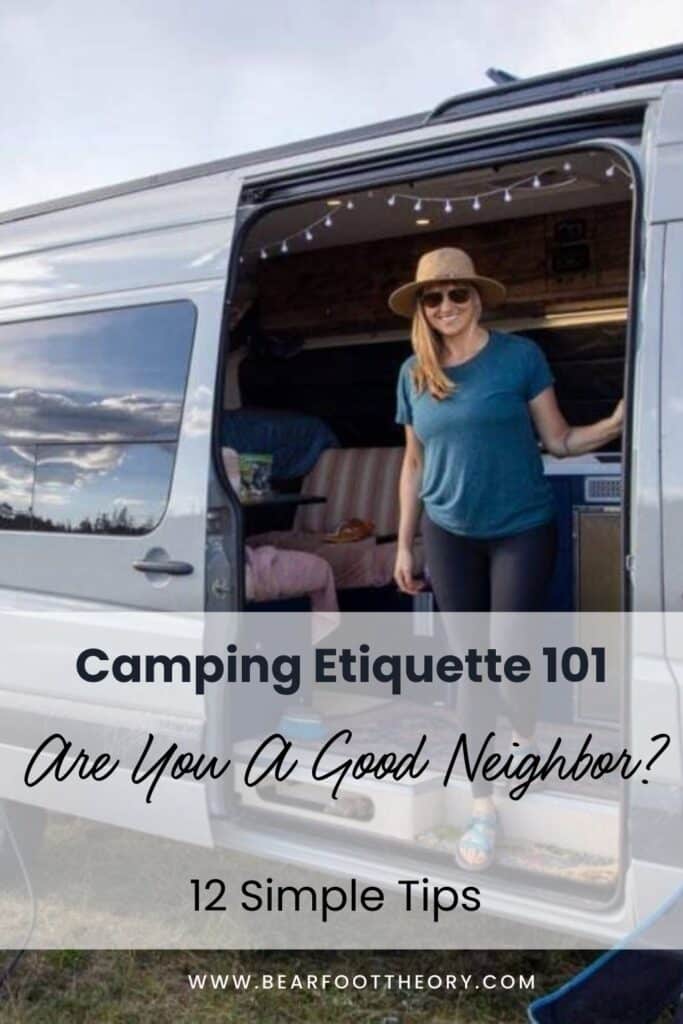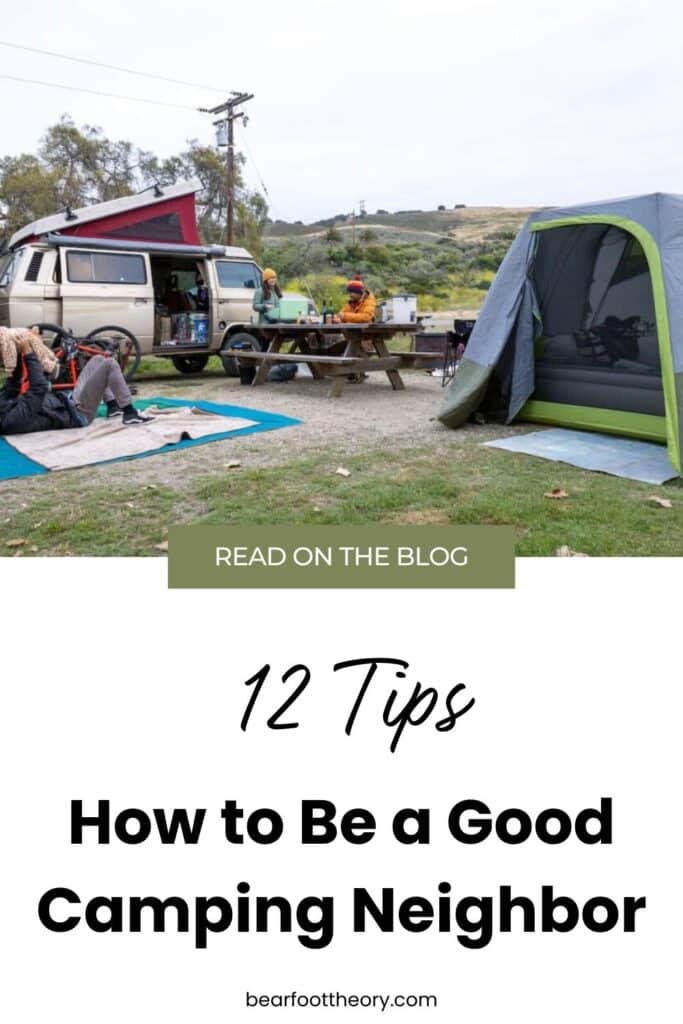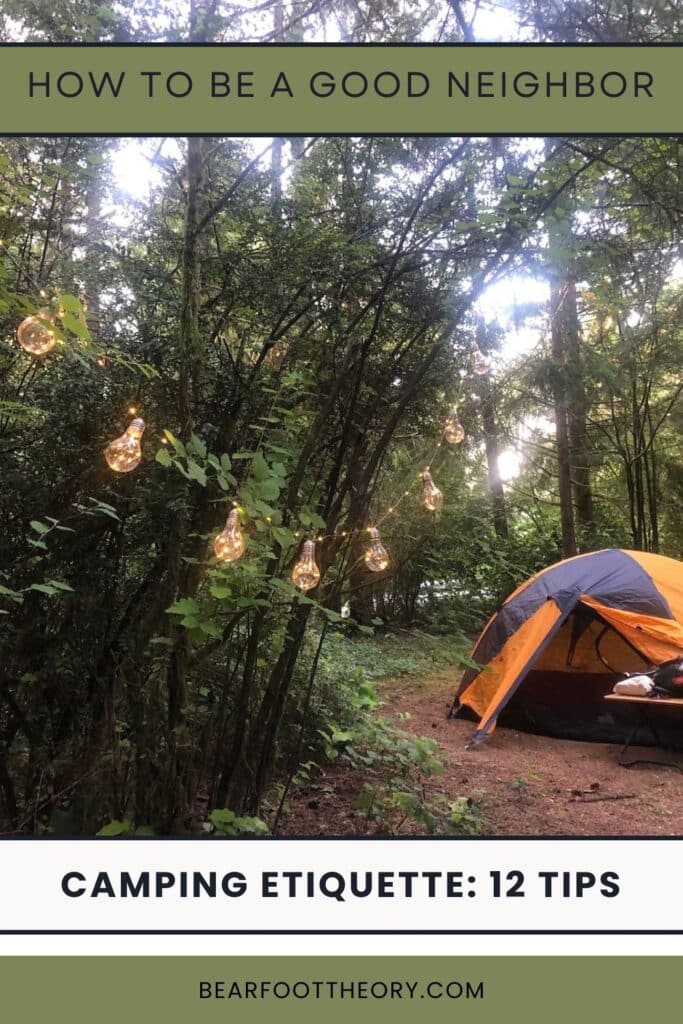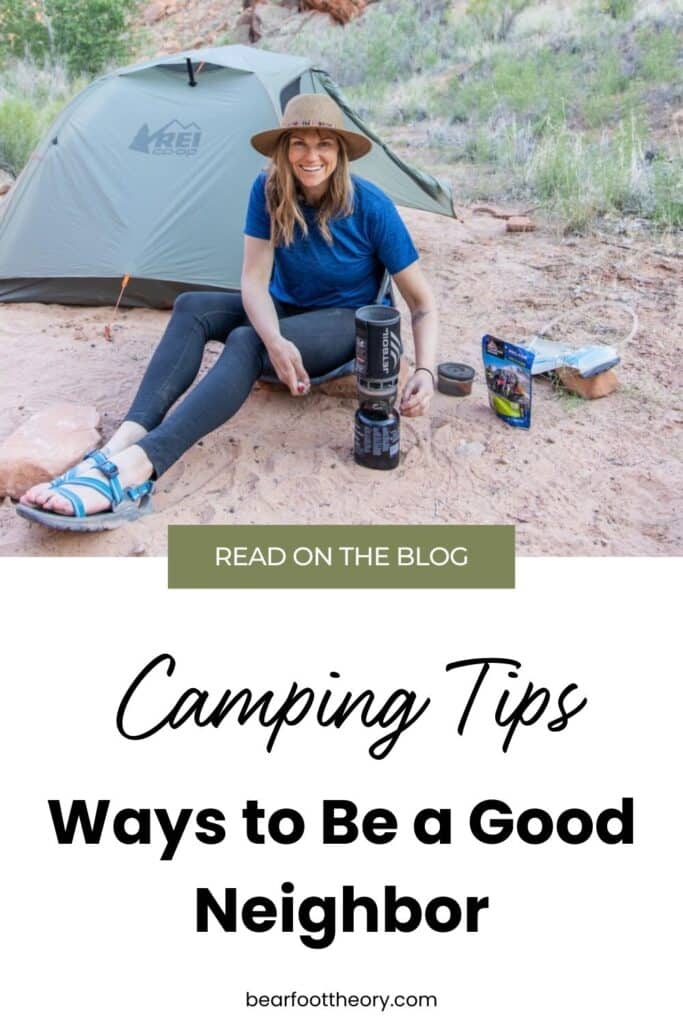Camping Etiquette: How to Not Piss off your Neighbors
Are you a good camping neighbor? Read on for 12 tips to foster good energy with those camping around you.
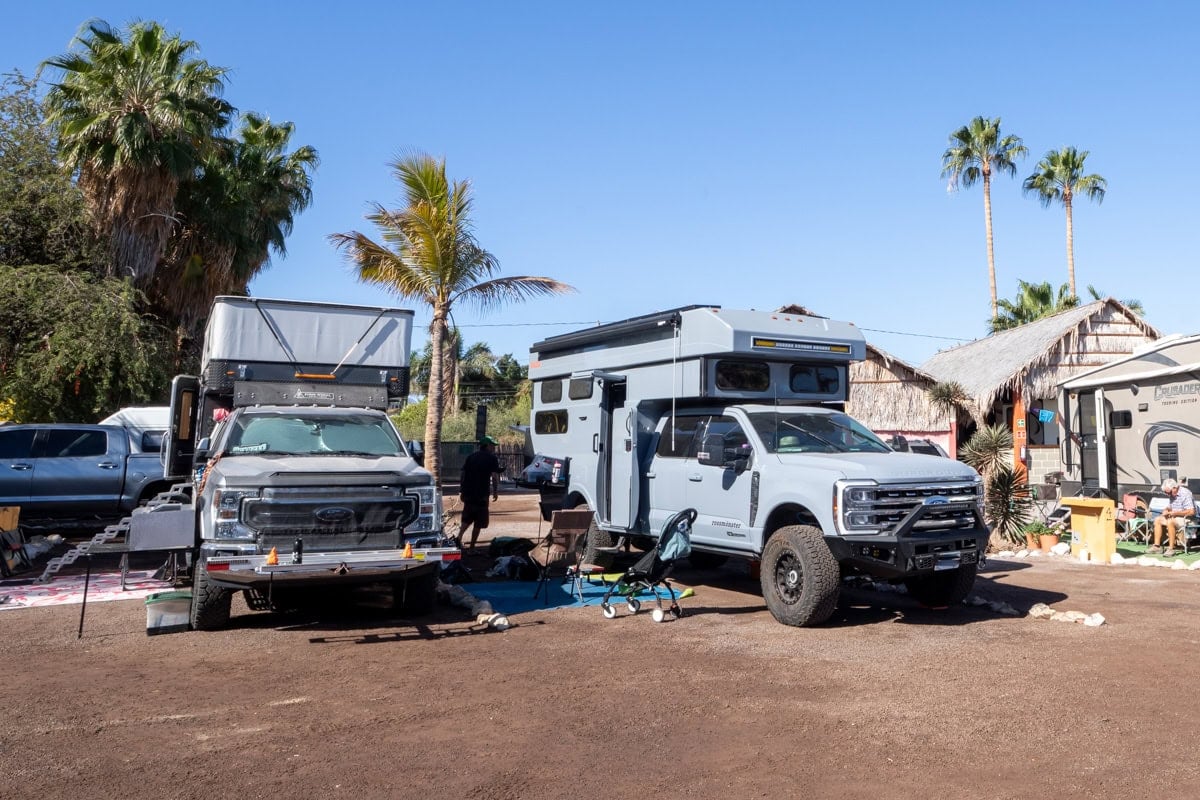
With how long I’ve been doing van life, I’ve experienced all kinds of neighbors at my campsites. I’ve had good neighbors who are kind, mindful of their noise, and respectful by keeping some distance between us. I’ve also had neighbors who have shared firewood, kitchen utensils, and advice for exploring the local area. I think we can all agree that these are the kinds of courteous camping neighbors we all hope for when we settle in on a Friday night.
On the opposite end of the spectrum, I’ve also had horrible campsite neighbors who have no concept of camping etiquette. Recently Ryan and I were down in Moab camping at a popular dispersed camping area. The people parked closest to us were playing music louder than a nightclub until 6 in the morning, shooting guns (where it definitely wasn’t legal), and shining their vehicle headlights directly on our campsite making it impossible to enjoy a night under the stars.
Needless to say, our dogs were freaked, we couldn’t sleep, and frankly we were pretty pissed that people could be so inconsiderate.
My golden rule while camping is that me having a good time shouldn’t affect your ability to have a good time. We should all be able to enjoy ourselves without negatively impacting those around us.
If you’ve been a Bearfoot Theory reader for a while, chances are, you are already a good campsite neighbor. But if you’re new to camping, you may not be aware of the unwritten campsite etiquette rules that good campers follow to create a positive atmosphere at the campground.
So whether you’re new to camping or seeking to improve your camping etiquette (that’s awesome), below are simple campsite etiquette tips that will foster a more enjoyable and comfortable experience for everyone. Your future camping neighbor will thank you!
This post may contain affiliate links.
1. Make Short and Sweet Introductions Early
Social interactions with strangers can feel uncomfortable, but it’s worth the effort to establish a courteous atmosphere right away. The introduction doesn’t have to be anything special, just a quick “hello” with your name, along with a sentiment like, “hope you have a great night” is plenty.”
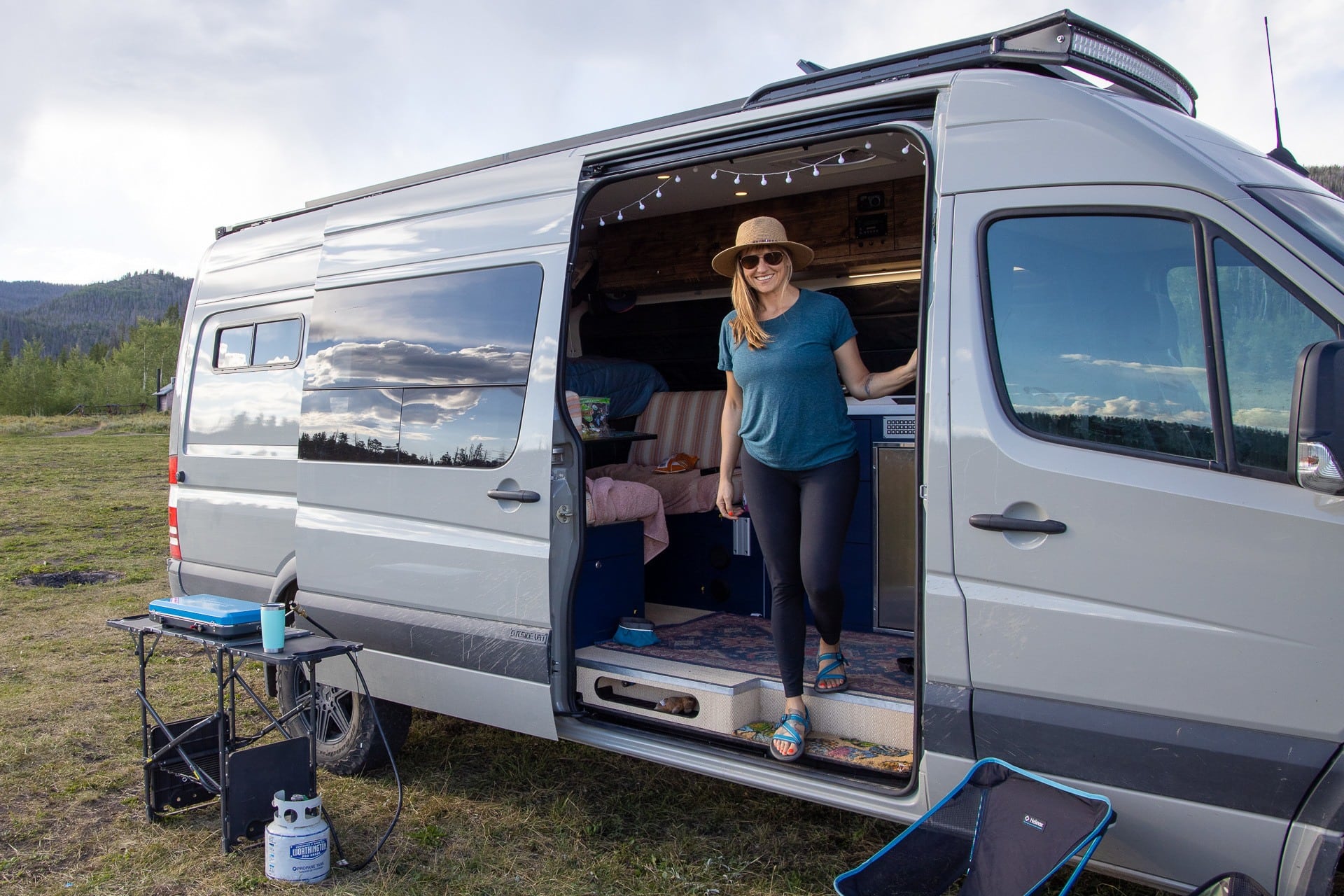
Of course, feel out the exchange. Some people want to chat it up, while other campers may be seeking quiet and alone time outdoors, perhaps yourself included. So there’s no need to dive into a “where are you from?” or small talk exchange. Take the pressure off! A smile and a nod can go a long way.
Save this post!
Enter your email & I'll send this post to your inbox! You'll also receive my weekly newsletter full of helpful advice for planning your adventures.
2. Keep a Considerate Distance
This may seem obvious, but if you’re camping at a campsite, stay within your area. Meaning, your tent, camping chairs, food, and backpacks (a.k.a everything) are set up in your designated zone — and are not infringing on anyone else’s campsite.
As for dispersed camping, there’s a good chance campers are choosing a more remote option over a campsite with people because they want peace and quiet. So setting up your tent or pulling up your giant rig right next to theirs can be pretty very irritating.
For example, one night Ryan and I were camping at a really sweet site with a direct view of Mount Baker. Around 11pm, a group of campers came and decided to set up shop literally 5 feet from our van. Even with our windows shut, I could clearly hear their conversation.

There were other dispersed sites available in the area, but we had a better view, so I presume that’s why they decided to intrude. Regardless, it’s pretty rude to set up that close to someone else, especially that late at night. Not only that, if I had been camping alone without Ryan, I would have felt very intimidated in this scenario.
If you are looking for a dispersed campsite on a Friday afternoon, you might be in a situation where there aren’t any available. In this case, you have two options. The first is to open your favorite campsite finder app and move along in hopes of finding an available site somewhere else. This is what Ryan and I do.
Alternatively, if there is a big dispersed site with more than one fire ring or lots of space for an additional vehicle, you can kindly ask the people who are already there if they mind if you stay for a night.
3. Don’t Cut Through Your Neighbor’s Campsite
Even if you’re just going to the bathroom, it’s not good campsite etiquette to cut through a fellow camper’s space. Take the long route. The few extra steps makes for a better, more respectful environment for everyone.
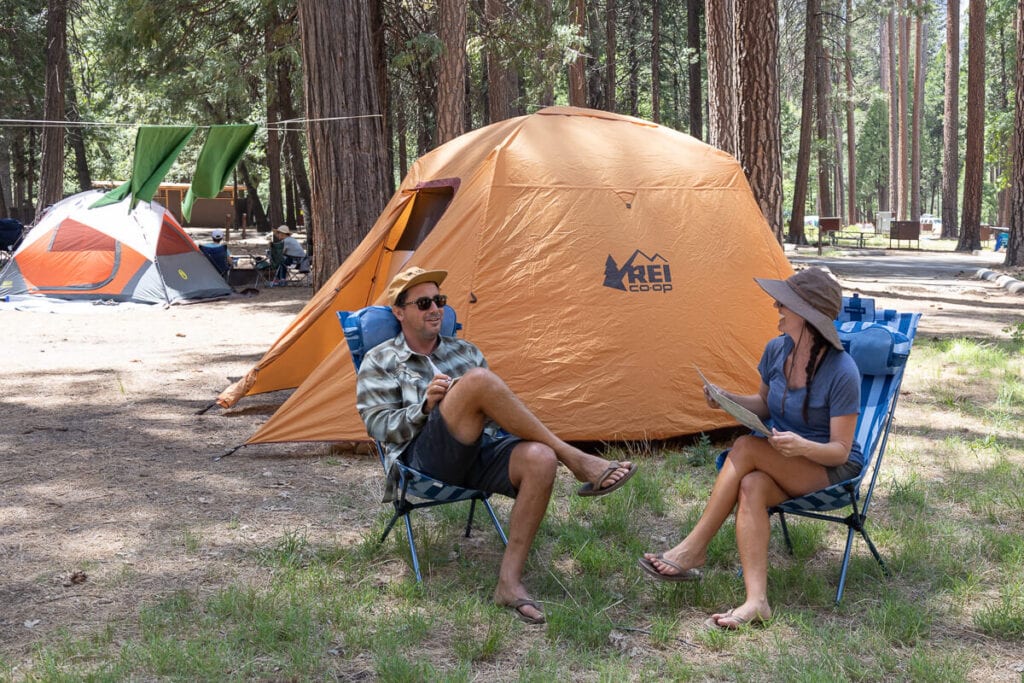
4. Keep Your Lights Down
When it comes to things like light and music, zones can get a little more complicated. For example, your lights may be set up in your area but neighbors can still see them. This can impede upon their ability to stargaze, sleep, and immerse themselves in nature.
Obviously, you need lights to see at night, especially when you’re setting up camp, but there is a difference between shining your vehicle’s headlights or a spotlight directly on your neighbor’s camp vs using a headlamp and some string lights to create a nice ambiance. You can also consider using red lights which are less jarring in the evening.
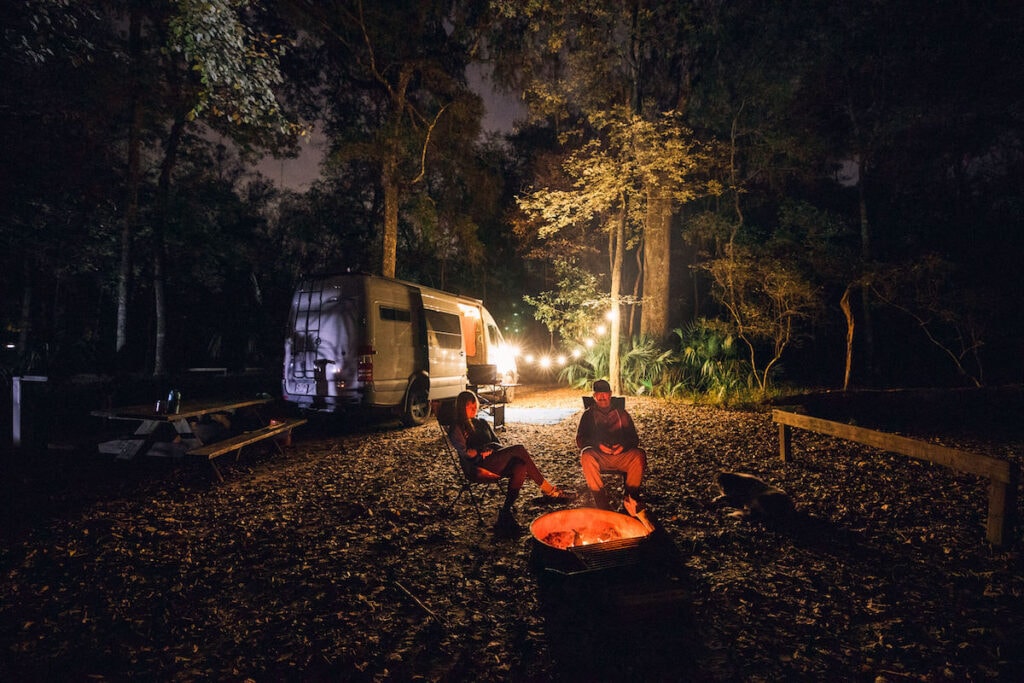
Read next: Explore the best headlamps while camping and backpacking.
5. Be Mindful of Noise Levels
Noise can make or break your neighborly relationships. Loud talking, phones beeping, music blasting from speakers and instruments, van doors slamming at 1am, generators buzzing — these are just some of the noises that can sour the experience fast for fellow campers.
You’re allowed to have a good time. No one is telling you that you can’t play some music or joke around with your friends. All I’m suggesting is that you be aware of your volume, especially during quiet hours, which are typically 10 p.m. to 6 a.m (see the posted quiet hours if you’re staying in an official campground).

On a related note, try to arrive at your campsite before dark so you can set up without disturbing people at night. Similarly, pay attention to your noise levels when tearing down your camp in the morning when your neighbors might still be sleeping.
6. Clean Up After Yourself
How someone handles their garbage says a lot about who they are. It’s a real indicator of respect for nature and others. So when in doubt, turn to the Leave No Trace principles, which is a set of rules to leave as small of a footprint as possible outdoors.
One of the principles is: dispose of waste properly. This means packing out all of your garbage, including toilet paper, apple cores, cigarette butts, and other food scraps. The firepit is not an appropriate place to leave your garbage. As always, whatever you pack in, be sure to pack out.
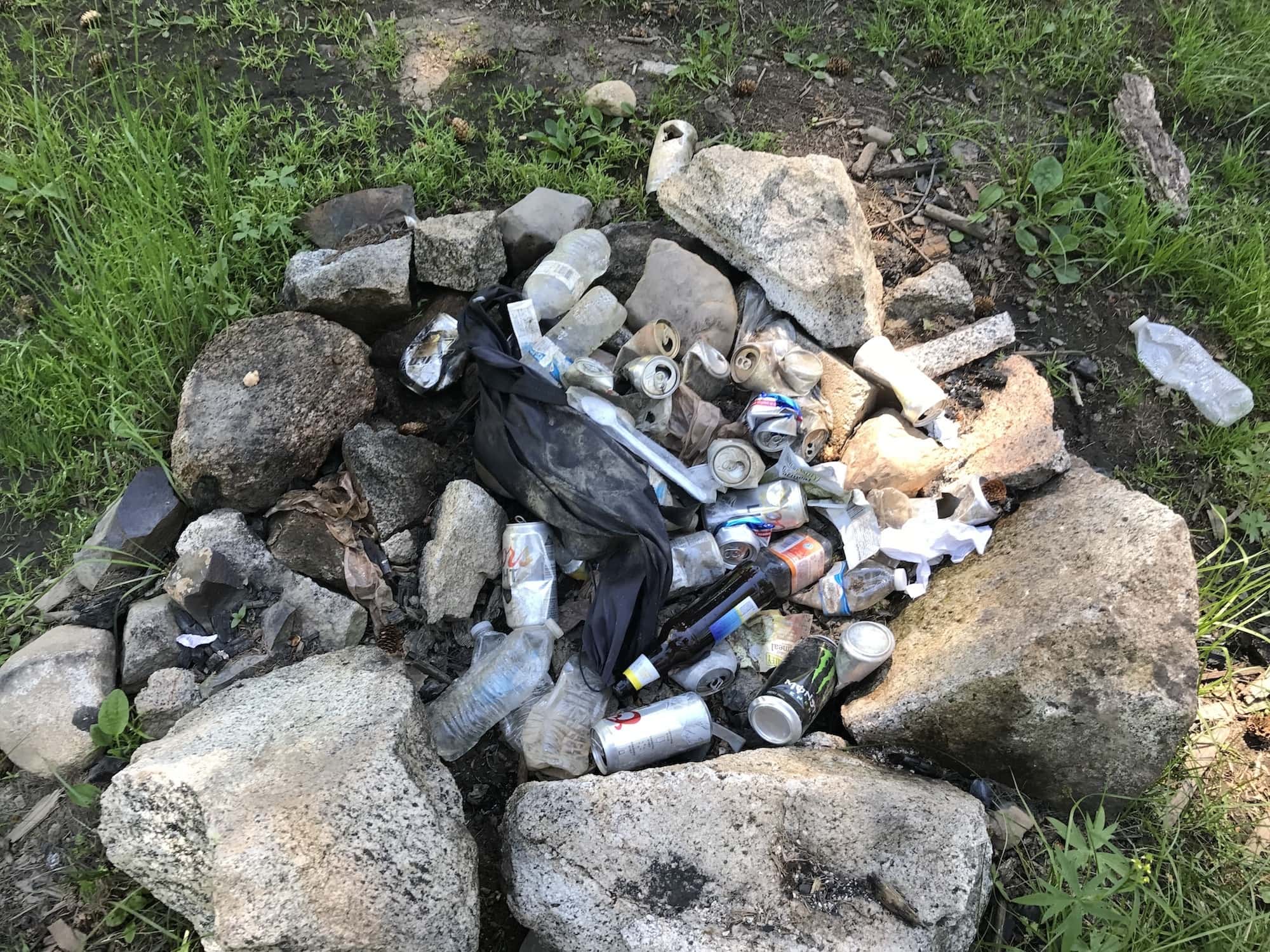
If you’re staying at a dispersed site and you don’t have a camping toilet, you’ll also want to follow Leave No Trace procedures for going to the bathroom. There’s nothing grosser than wandering into the trees to do your business and stumbling on a fresh surface dump (i.e. human poop that hasn’t been properly buried).
7. Put Out Your Campfire
Many times I’ve been at campsites where the neighbors’ fire is either smoldering or still on fire. This is dangerous and leaves the onus on your neighbor to monitor it or put it out.
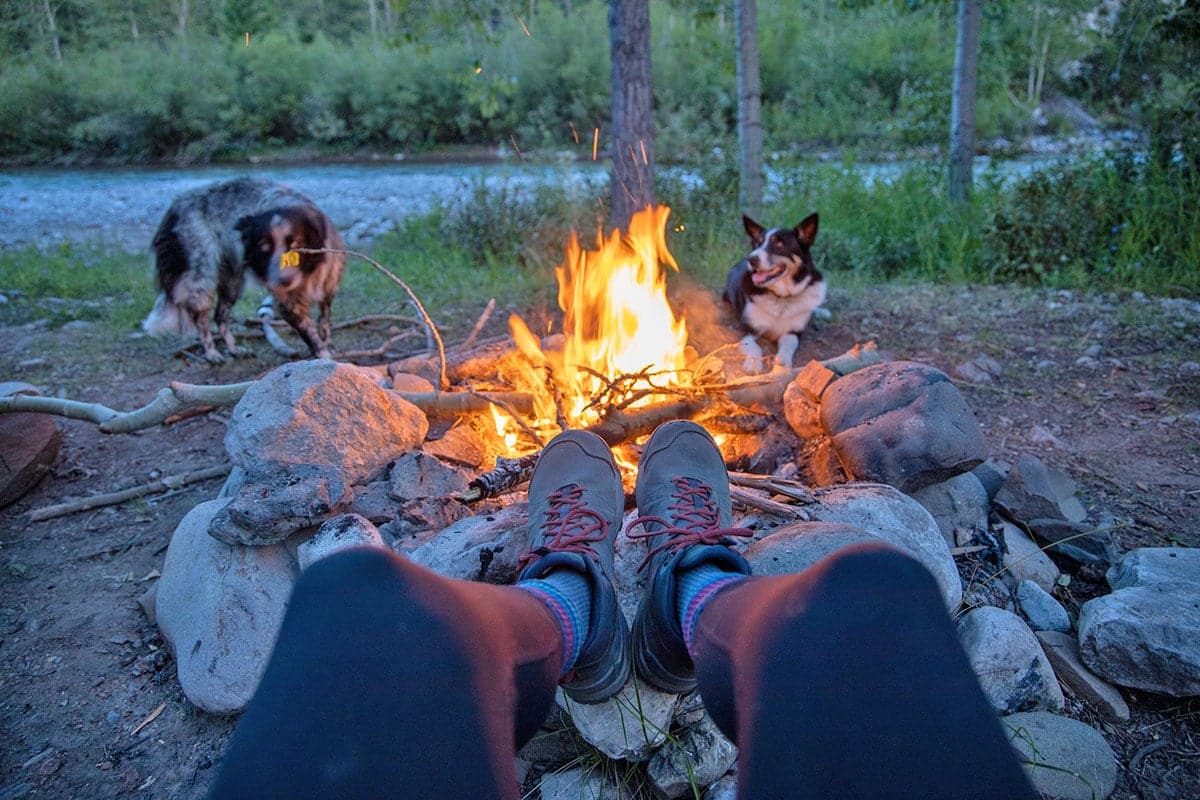
Good campsite etiquette means dousing your campfire with water and making sure it’s 110% out before you leave for the day. Read more tips on how to have a safe campfire.
8. Go the Extra Mile with Extras
If you have extra firewood or other supplies left over, consider offering it to your camping neighbor. You’ll feel good and there’s a good chance they’ll be grateful. Win win.
9. Keep a Close Eye on Your Pets
There’s no doubt camping with pets can be wonderful and it can be a great time to let them explore. But it’s in everyone’s best interests to make sure dogs do not wander into other people’s campsites and are not left unattended.
Recently, I took my dogs down to Baja in my truck camper, and we spent most of our time camping for free at dispersed spots right on the beach. One of the things I love about camping at dispersed sites—whether in Baja or here in the U.S.—is the freedom.
It’s pretty common (and pretty wonderful) to see dogs roaming around off-leash. Honestly, that’s one of the perks of choosing dispersed camping over crowded campgrounds. Just be sure your dog stays within sight and close enough that you can call them back easily if you need to. Safety always comes first.
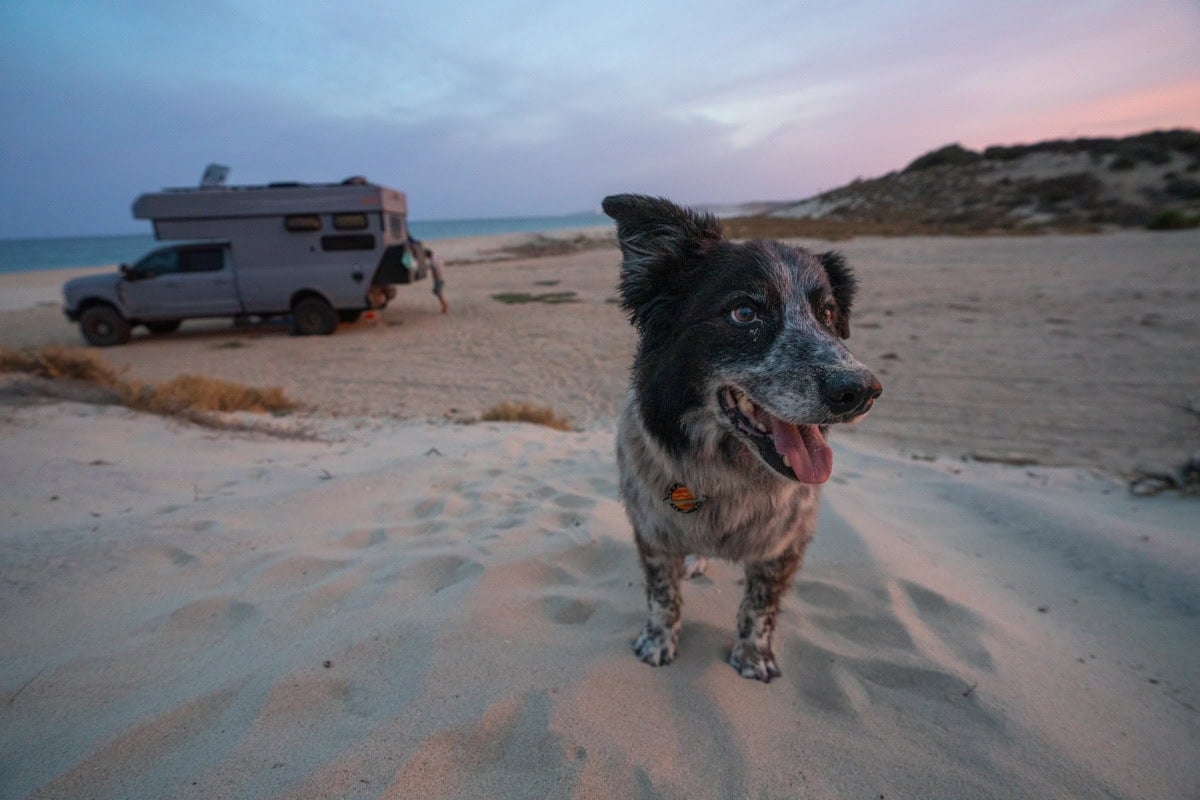
You might have the friendliest dog in the world, but what if your neighbor’s dog is territorial? Your dog could get attacked. Or you might just have neighbors who don’t like dogs (or are fearful of dogs) and who knows how they might treat your dog if you aren’t watching.
On the other hand, your neighbor might be stoked to meet your dog or to let your dogs play together. In that case, have at it. All it takes is a little communication to see what everyone is comfortable with.
Another issue is people leaving their dogs tied up when they aren’t there. Naturally, these dogs bark, bothering just about everyone else at the campsite. If it’s just a quick trip to the bathroom, that’s fine, but don’t leave your dog at your campsite alone while you go for a hike.
Read next: Love to travel with your canine companion? These 15 tips will help you make road tripping with your dog a success.
Here are some other general rules to keep in mind when camping with dogs:
10. Don’t Let Your Kids Bother your Neighbors
Similar to fur babies, keeping an eye on your kids is very important campsite etiquette for establishing a comfortable camping atmosphere for everyone. While this may be hard for a parent to believe, not everyone likes kids.
Before having one of my own, I was one of those people. The last thing I wanted was some random child coming into my campsite looking to talk or be entertained. I know I probably sound like an awful person saying that, but if you want to be a good camp neighbor, understand that kids aren’t up everyone’s alley.
This means, don’t leave kids unattended, ensure they’re not wandering into someone else’s campsite, and remind them to keep their noise levels to a reasonable level.
Of course, life happens. Noise happens. Kids are allowed to (and should) have fun, and camping is a great way to expose kids to the outdoors, which frankly we need more of. It’s also a good opportunity to teach them camping etiquette while they are young!

Read next: See our in-depth guide filled with tried-and-true tips on how to successfully go camping with kids.
11. Watch Out for Each Other
Just paying attention is one of the best ways to be a good camping neighbor. If you notice something you think should be on their radar — like an animal or safety hazard — give them a heads up. It’s those little gestures that make camping a much nicer experience.
If you saw a squirrel or bird attempting to get into the bag of chips they left on their picnic table, let them know so they don’t leave food out next time. Or if the nearest toilet is out of toilet paper, give them a heads up
There’s a special comfort in knowing the people around you are looking out for one another. So don’t underestimate a small act of kindness.
12. Remember, the Outdoors is for All
Above all, treating everyone and everything with respect and care is the key to being a good camping neighbor. Make eye contact, keep biases in check, respect each other’s boundaries, and remember the outdoors belongs to us all.
More Campsite Etiquette Tips
Looking for more tips to be the best camping neighbor? Here are more to add to your campsite etiquette toolbox.
Being a good camping neighbor is easy, and I hope these campsite etiquette tips give you some ideas on how to contribute to a positive environment on your next camping trip. If you say hello, turn down your music, pick up trash, and treat others with respect — you’re setting an awesome example of a wonderful neighbor while camping, and really, anywhere!
READ NEXT
Looking for more tips to make the outdoors more enjoyable for everyone? Check out some of these posts:



